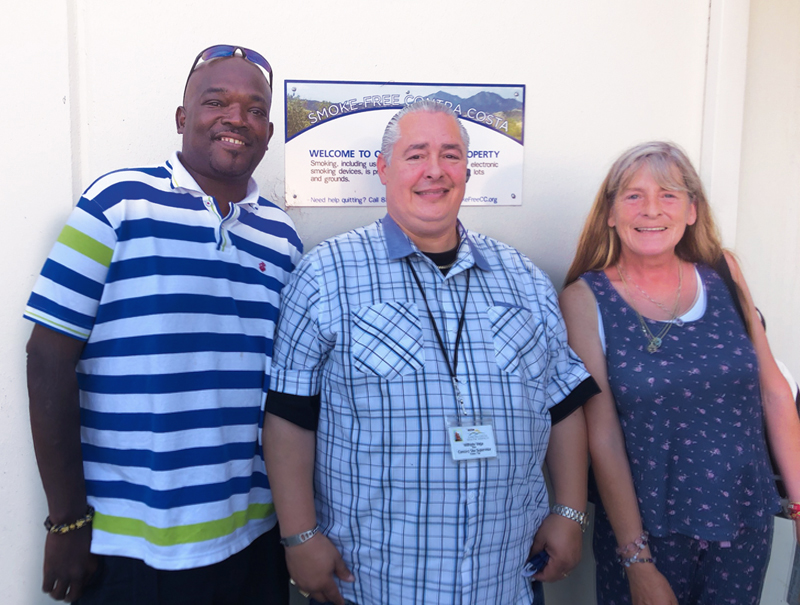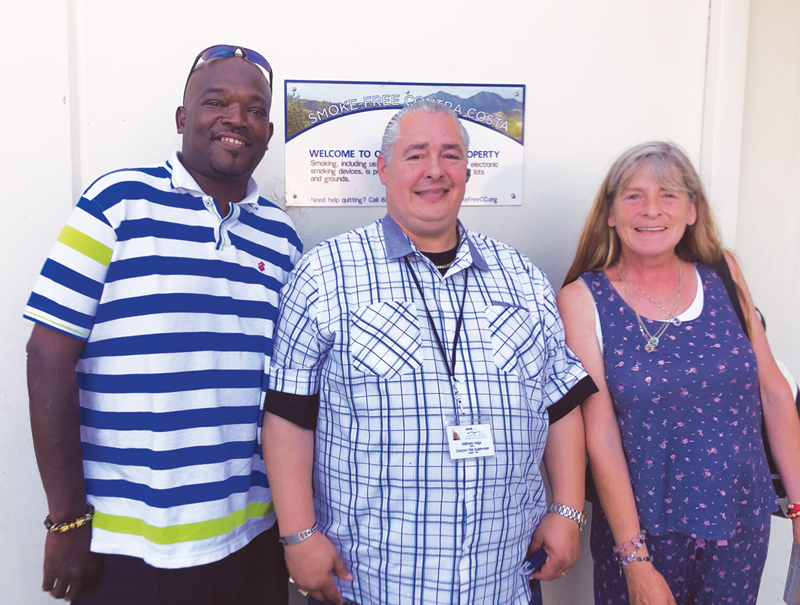
Renovated Concord homeless shelter reopens with privacy, pocket park and a place for pets

CONCORD, CA – Making the $1400 rent payment every month for their small Concord apartment was a juggling act for Laurie Goodwin, 60, and her significant other, both on disability. “We’d use his check for the rent and mine for everything else,” Goodwin said.
It was a struggle, but they were getting by. That is, until she got lung cancer and he died suddenly of a blood clot. Alone, aging, sick and with no money, Goodwin was homeless. She spent the next two years in a Concord motel, the county’s temporary homeless shelter set up under the Concord Project Homekey program during the pandemic.
Eugene Hampton, 54, is an artist. Like Goodwin, he is on disability. Recently pardoned and released from a Kansas prison and seeking something better, he made his way to Concord and the same makeshift shelter where Goodwin lived.
When the newly renovated Concord Shelter and Service Center opened June 24 after being closed for over a year during the pandemic, Goodwin and Hampton were both among the first residents transferred in. Within days, all 64 beds were full.
Couples and multigeneration families
Funding under a federal C.A.R.E.S. grant replaced the former open dormitory with private “sleep stations” and rooms for couples and individuals with special needs.
“This is the only shelter in the county that accepts couples and multi generation families,” said Michael Fischer, County Health Services Administrator, during our recent tour of the facility.
Privacy is a chief concern, and the women’s and men’s sleeping quarters are on separate sides of the building.
“Male coming in,” Fischer announced as we moved into the women’s quarters. Neat little cubicles, each with a bed, a desk and chair, USB charging port and a chalk board had high windows to maintain privacy but still allow for safety checks by the staff.
Resident facilities include modern bathrooms and showers, laundry room, microwaves and community room. Individuals with pets can keep them in the kennels in the back next to a “pocket park,” a little welcome green space in all the asphalt and concrete.
The facility is no longer a “dry” shelter, barring anyone under the influence from the premises. This was once a huge barrier to many needing the shelter. Current policy does not require complete abstinence, but alcohol and drugs are strictly prohibited at the facility.
More than a place to crash for the night
The shelter is far more than just a place to crash for the night. The service center, which opens in August, brings together all the resources needed to transition from homelessness into permanent housing. Medical services, respite care, employment services, 12-step meetings, mail services and a warming center are available to both shelter and non-shelter individuals.
How many homeless are on Concord streets is a mystery. There is a huge disconnect between the “official” number and the estimates by those who serve the population. The number from the last Point In Time count in 2020 is 165. Councilmember Edi Birsan scoffs and mentally doubles it to account for those missed in the count.
“I’ve done that count before and I know at least half are missed,” he told the Pioneer.
Willy Vega, site supervisor at the shelter, estimates “5,000-6,000” are homeless in Concord.
Birsan says that is far over-estimated.
“I’m not sure what is gained by inflating the number. We can’t save everyone,” he said. “Lots of people would go crazy in a room.”
Clients come to the shelter through the Coordinated Outreach Referral Engagement team. “Referrals are based on need and vulnerability like health and age,” Vega said. “And on a motivation to do better.”
Hampton and Goodwin have both been approved for permanent housing and are waiting for the keys to their apartments. They will continue to be neighbors in the same complex.
“We save the ones we can,” Birsan said.
